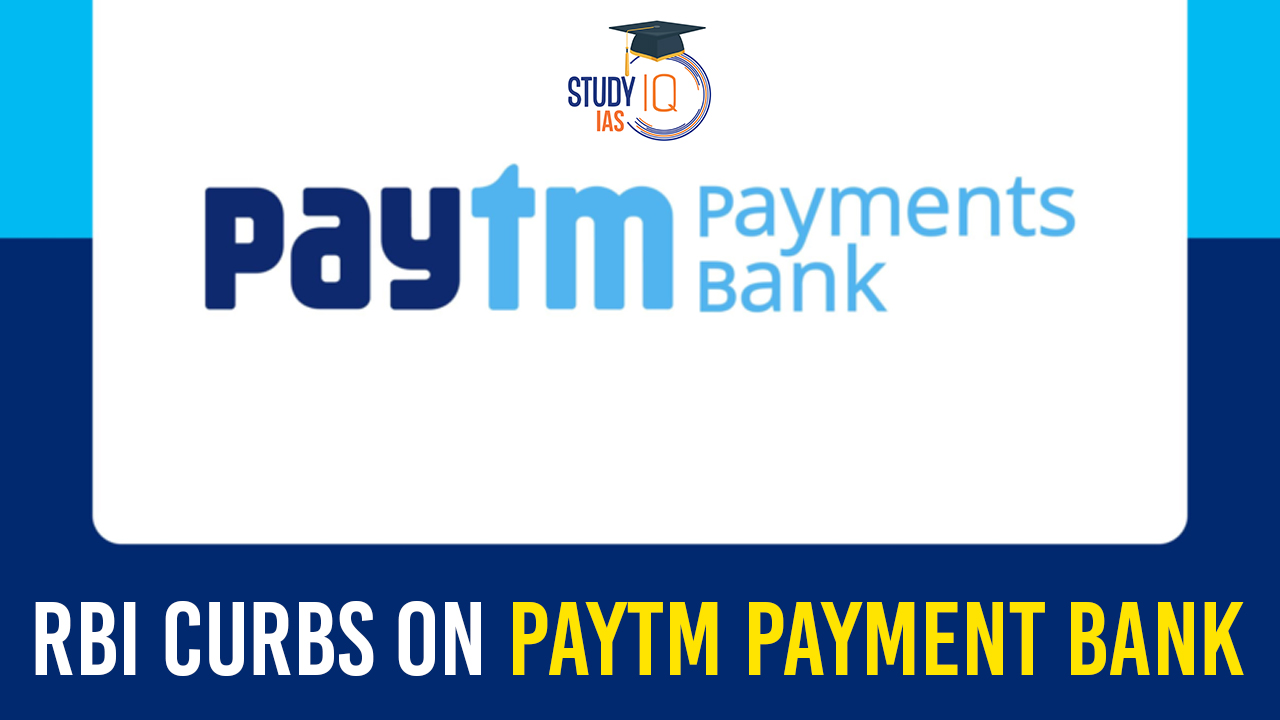Table of Contents
Context: The Reserve Bank of India barred Paytm Payment Bank from offering all its core services including wallets and accounts. This action does not revoke Paytm’s licence but severely limits its operations.
PayTM Payment Bank: Background and Compliance Issues
- Paytm Payments Bank, linked to its parent company One97 Communications, has been under RBI scrutiny since 2018.
- The central bank had previously imposed a fine and ordered the bank to stop onboarding new customers due to concerns over compliance with know-your-customer (KYC) norms and other regulatory mandates.
- There were also issues with data and information barriers within the group, and indirect shareholding patterns in the payments bank through the parent company stakes.
Services Affected after RBI Curbs on PayTM Payment Bank
- The RBI’s directive disallows Paytm from offering almost all of its banking services, specifically affecting operations like AEPS, IMPS, and BBPOU and mandating the termination of all nodal and pool accounts by the end of February 2024.
- The directive, however, allows existing customers to continue using their accounts without new restrictions.
- The bank can still facilitate withdrawals and continue offering services to existing customers.
- Accounts remain functional, with services like savings accounts, FASTags, NCMC, etc., permitted without new restrictions for the current customers.
We’re now on WhatsApp. Click to Join
What Are Payment Banks?
- Primary Goal: Payment banks aim to enhance financial inclusion by offering savings accounts and payment/remittance services to the underserved sectors like migrant workers, low-income households, and small businesses.
- Examples: Airtel Payments Bank, India Post Payments Bank, and Fino Payments Bank.
- Banking Licences: The Reserve Bank of India issues two types of banking licences:
- Universal bank licence
- Differentiated bank licence (payment banks fall under this).
- Services Limitation: Payment banks are restricted from offering full services like commercial banks.
- Cannot lend.
- It can take deposits up to Rs.1 lakh per account
- It can issue debit cards but not credit cards.
- Additional Functions: Payment banks can act as business correspondents for other banks and distribute straightforward financial products like mutual funds and insurance.
- Capital Requirement: The RBI has set the minimum paid-up equity capital for payment banks at ₹100 crore.
- Deposit Utilisation: Payment banks must invest a minimum of 75% of their demand deposit balances in short-term government securities
- It can hold up to 25% of commercial bank deposits for operational and liquidity management purposes.
- Eligibility for Licence: They are licensed as payment banks under Section 22 of the Banking Regulation Act of 1949 and are regulated by the Reserve Bank of India.


 SAMARTH Udyog Bharat 4.0: Transforming I...
SAMARTH Udyog Bharat 4.0: Transforming I...
 BHIM 3.0 Launched by NPCI: Key Features,...
BHIM 3.0 Launched by NPCI: Key Features,...
 150th Summit of Inter-Parliamentary Unio...
150th Summit of Inter-Parliamentary Unio...





















